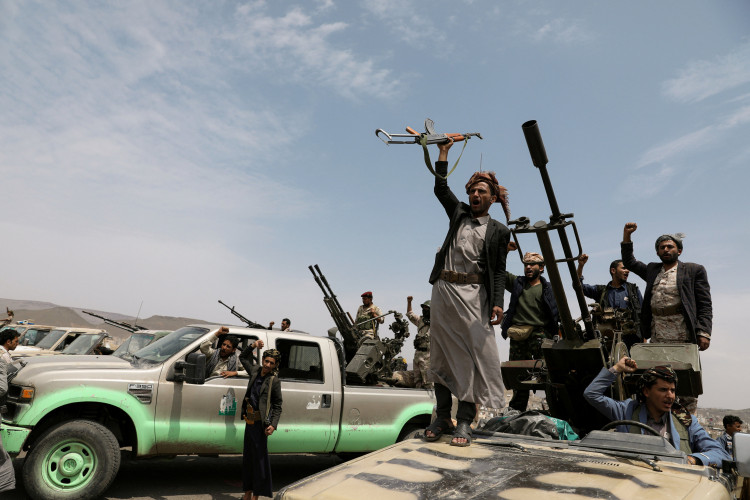U.S. and British naval forces have thwarted a substantial aerial assault by Yemen's Houthi rebels in the southern Red Sea. This incident, involving the interception of 21 drones and missiles, is marked as the largest militant attack in this strategic maritime area to date. The Houthis, operating from Yemen, have increasingly targeted international shipping lanes, critically disrupting global commerce and raising security concerns in a region already fraught with conflict.
The U.S. Central Command confirmed that the joint operation resulted in no reported injuries or damages. This defensive action successfully neutralized 18 drones, two anti-ship cruise missiles, and one anti-ship ballistic missile, showcasing the naval prowess and coordinated efforts of the U.S. and British forces.
British Defence Minister Grant Shapps, in a statement, emphasized the severity of the attack, saying, "Overnight, (Royal Navy ship) HMS DIAMOND, along with U.S. warships, successfully repelled the largest attack from the Iranian-backed Houthis in the Red Sea to date." He added that such actions were unacceptable and warned of repercussions, stating, "We will take the action needed to protect innocent lives and the global economy."
This recent surge in Houthi attacks underscores the group's support for Hamas amidst the ongoing Israel-Hamas conflict in Gaza. By targeting these crucial maritime routes, which account for approximately 15% of the world's shipping traffic, the Houthis have significantly impacted international trade. Many shipping companies have been compelled to reroute their vessels, opting for longer journeys around Africa, though some continue to brave the troubled waters.
The impact of these attacks extends beyond the immediate region. A spokesperson for German shipping group Hapag Lloyd expressed their concerns, stating, "We will continue to avoid the Suez Canal and the Cape of Good Hope for security reasons." This sentiment was echoed by Danish shipping giant Maersk, which announced its avoidance of the route "for the foreseeable future."
Retailers worldwide, already bracing for the impact of China's Lunar New Year holiday, are seeking alternatives like air or rail transport to avoid supply chain disruptions. These adjustments come amid fears of empty shelves in the spring season, highlighting the far-reaching consequences of the conflict.
The Houthis, a Shiite group backed by Iran and holding sway over much of Yemen, have vowed to persist with their attacks until there is a cessation of hostilities in Gaza. They have also threatened to target U.S. warships if their group faces direct retaliation.
As tensions escalate, the international community's response becomes crucial in maintaining the delicate balance of power in the Middle East. The potential for these conflicts to spill over into broader regional or global confrontations remains a significant concern, with the safety and stability of crucial maritime trade routes hanging in the balance.




